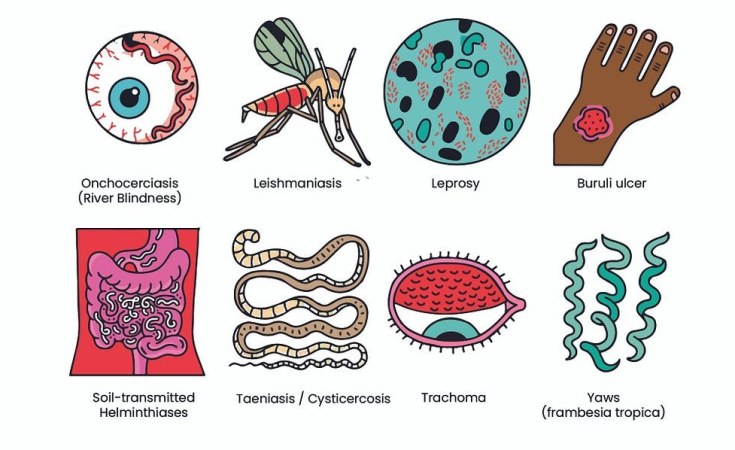Poverty is among the primary drivers of neglected tropical diseases (NTDs). According to Gavi, the Vaccine Alliance, 100 million Nigerians are estimated to be at risk of at least one NTD, with several million individuals affected by one of them. These NTDs such as lymphatic filariasis, onchocerciasis, schistosomiasis and noma disease have had a devastating impact on communities.
The effect of NTDs goes beyond health and well-being to economic prosperity. The World Health Organization (WHO), estimated that household income lost due to out-of-pocket health costs and wages lost due to NTDs globally is at least US$ 33 billion per year. NTDs have had a considerable financial effect on households affected by NTDs.
In country efforts
Due to the fact that effect assessments and a good understanding of the disease burden is lacking, progress in the intensive management of NTDs remains largely unmeasured. In 2013, the Federal Ministry of Health (FMoH), recognised new opportunities for support in eradicating NTDs in Nigeria. Through the United States Agency for International Development (USAID) Act East initiative, two states have eliminated Lymphatic Filariasis (Nasarawa and Plateau); six have interrupted onchocerciasis (Abia, Delta, Enugu, Imo, Nasarawa, and Plateau); and trachoma has been eliminated in three states (Ebonyi, Nasarawa, and Plateau).
Notable advancements have been made in the fight against trachoma, with continuing surgical interventions being provided, and 103 of 126 LGAs that are endemic for the disease have halted the disease. In December 2023, WHO announced the inclusion of noma in its official list of neglected tropical diseases (NTDs). This decision is largely due to the efforts of the Nigerian government in leading the action for the inclusion of this disease, amplifying global awareness in a bid to control it.
These efforts in addition to Mass Drug Administration (MDA), vector control, research and policy development are crucial elements of a broad strategy to combat and ultimately eradicate NTDs.
Neglected once again
The Federal Ministry of Health and Social Welfare (FMoHSW) recently launched a strategic blueprint for Nigeria's health sector (2023 to 2026) with the goal to save lives and reduce both physical and financial pains for all Nigerians. The plan clearly defines the vision, guided by key outcomes being measured across various issues, including non-communicable and communicable diseases, risk factors, and maternal health amongst others, however, there is silence on NTDs.
Support from the federal government and policymakers is essential to support the efforts to eradicate NTDs in Nigeria. The quest to combat NTDs offers great promise as the bid to eliminate NTDs is aligned with interventions that directly contribute to the attainment of the Sustainable Development Goals (SDGs), fostering global health, well-being, and equity.
For Nigeria which accounts for around 25% of Africa's NTD cases, addressing NTDs is essential to breaking the cycle of poverty (SDG 1). Effective global collaborations (SDG 17) are the driving force behind strategies like mass medicine administration or the integration of NTDs with water and sanitation initiatives (SDG 6). Hunger and malnutrition will also decrease as a result of NTD interventions.
A look at the numbers
By 2050, there will be over 300 million people living in Nigeria, so alleviating the country's NTD burden will have a positive impact on both health and educational standards.
Beyond productivity gains, the elimination of non-transferable debt from NTDs generates substantial financial benefits from an economic perspective. Increased labour productivity is anticipated to contribute $18.9 billion to Nigeria's GDP in 2023-2030, if NTD are eradicated by 2030. The EndFund-Deloitte "Ending The Neglect: Cost-Benefit Analysis of Eliminating Neglected Tropical Diseases in Nigeria by 2030" report predicts that these benefits will endure until 2030, as individuals who are cured or capable of preventing infection will continue to enjoy extended and more fruitful lives.
The benefit of eliminating NTDs includes reduced out-of-pocket expenses, higher school attendance rates, and better carer productivity all of which contribute to Universal Health Coverage and an overall progressive society.
The fight demands more
This year's theme for World NTD Day is Unite, Act, and Eliminate and while Nigeria has made remarkable progress in the fight against NTDs, the fight demands more.
Strengthening healthcare systems through improving access to quality healthcare, particularly in rural areas, is crucial for early diagnosis and treatment of NTDs. Educating communities about the link between NTDs and malnutrition, promoting hygiene and sanitation practices, including providing comprehensive nutritional support for pregnant women and children is important.
Addressing the root causes of both NTDs requires multi-sectoral cooperation between Ministries of Health, Agriculture, Education and Water Resources and Sanitation, and others. While advocacy and resource mobilisation for sustained national and international commitment, both in funding and technical support, is central to ensuring long-term impact.
The fight against NTDs demands more attention, resources, and collaboration to alleviate the suffering of those most vulnerable. Unfortunately, despite the significant impact of NTDs particularly on the poorest and most vulnerable populations, they often remain in the shadows of global health priorities. NTDs demand increased funding, and collaborative efforts to create sustainable solutions, but more importantly, it requires more attention from us all.


